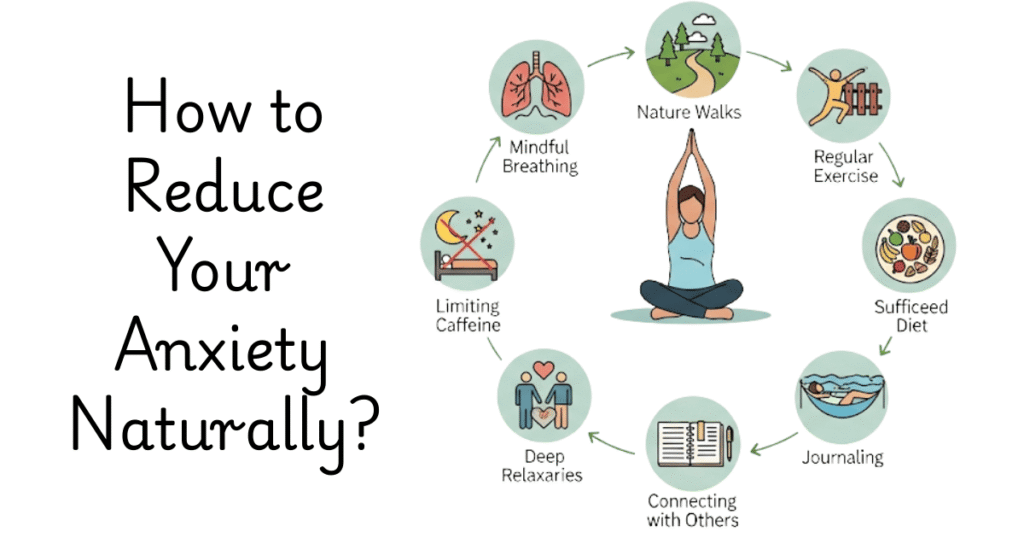
Anxiety is something most of us face at some point. It shows up as racing thoughts, tension in the body, or a constant sense of worry. While therapy and medical care are important for severe anxiety, everyday habits can make a big difference too. Small, consistent actions often help reduce anxiety by calming the mind and balancing the body. In this guide, we’ll look at 10 daily habits you can practice to reduce anxiety naturally.
Read more: How Australian Clinical Psychologists Use Nature Therapy to Treat Stress and Anxiety
Key Takeaways
- Simple habits like breathing, exercise, and sleep can help reduce anxiety naturally.
- A healthy diet with foods that reduce anxiety fast supports emotional balance.
- Limiting caffeine, news, and social media can calm the mind.
- Journaling, mindfulness, and connecting with loved ones are powerful natural ways to reduce anxiety.
1. Start the Morning with Deep Breathing
Breathing deeply is one of the easiest ways to reduce anxiety. A simple breathing routine each morning signals your body to relax.
- Sit upright and inhale through your nose for 4 seconds.
- Hold your breath for 4 seconds.
- Exhale slowly through your mouth for 6–7 seconds.
- Repeat 5–10 times.
Deep breathing slows your heart rate and helps you start the day feeling calm and centered.
2. Exercise Regularly
Moving your body is a proven method on how to reduce anxiety. Exercise releases endorphins, the “feel good” chemicals in the brain. You don’t need to spend hours at the gym—30 minutes of walking, jogging, cycling, or yoga can lower stress levels.
Research shows that people who exercise regularly report fewer anxiety symptoms compared to those who don’t (Harvard Health, 2020).
3. Choose Foods That Reduce Anxiety Fast
Your diet plays a big role in how you feel. Some foods that reduce anxiety fast include:
| Food | Benefit |
| Salmon | Rich in omega-3s that support brain health |
| Yogurt | Contains probiotics that help gut-brain balance |
| Green Tea | L-theanine promotes calmness |
| Dark Chocolate | Boosts serotonin and mood |
| Berries | Packed with antioxidants that reduce stress |
Limiting caffeine and sugar also helps because they can trigger jittery feelings.
4. Practice Mindfulness or Meditation
Mindfulness trains your brain to stay in the present moment. Spending even 10 minutes daily on meditation reduces negative thought loops. You can use free apps like Headspace or Calm, or simply sit quietly and focus on your breath.
Mindfulness is one of the most effective natural ways to reduce anxiety because it interrupts the habit of overthinking.
5. Keep a Consistent Sleep Schedule
Lack of sleep can make anxiety worse. Going to bed and waking up at the same time each day helps regulate your body clock.
Some tips for better sleep:
- Avoid screens an hour before bed.
- Keep your room cool and dark.
- Try herbal teas like chamomile.
Quality rest restores your nervous system and helps your mind stay balanced.
6. Limit News and Social Media Overload
Constant scrolling and news updates can trigger stress. Setting boundaries around screen time is one of the overlooked ways to reduce anxiety. Try:
- Checking news only twice a day.
- Setting daily limits on social media apps.
- Replacing screen time with reading, journaling, or walks.
This shift creates mental space and reduces unnecessary worry.
7. Stay Hydrated Throughout the Day
Dehydration can affect your mood and concentration. Drinking enough water is a simple but powerful habit. Aim for 6–8 glasses daily. Herbal teas or infused water with lemon or mint can make it easier. A hydrated body supports a calmer mind.
8. Journaling for Mental Clarity
Writing down thoughts helps you organize your feelings and reduces mental clutter. Each night, write three things that went well and one thing that worries you. This practice shifts focus toward gratitude while still acknowledging your stress. Over time, journaling builds resilience.
9. Connect with Loved Ones
Talking to friends or family provides emotional support. Human connection reduces feelings of isolation, which often fuel anxiety. Even a quick call, message, or walk with someone you trust can help you feel grounded and supported.
10. Create Small Daily Rituals
Consistency is calming. Whether it’s morning coffee, evening prayer, or stretching before bed, rituals give your day structure. These small acts train your brain to expect calmness at certain points of the day, which lowers overall anxiety.
FAQs
Q1: What are the best foods that reduce anxiety fast?
Salmon, yogurt, green tea, berries, and dark chocolate are excellent choices. They contain nutrients that balance mood and reduce stress.
Q2: Can exercise really reduce anxiety?
Yes. Regular movement releases endorphins and lowers stress hormones, making it one of the most effective natural treatments.
Q3: How can I reduce anxiety without medication?
Daily habits like mindfulness, deep breathing, exercise, and healthy eating are proven ways to reduce anxiety without medication.
Q4: How long does it take for natural methods to work?
Some techniques like breathing and mindfulness can work instantly, while long-term habits like sleep, diet, and exercise show results in weeks.
Conclusion
Learning how to reduce anxiety doesn’t always require big changes. By adding small daily habits, you can slowly re-train your body and mind to feel calmer and more balanced. The key is consistency—practice these habits regularly, and you’ll likely notice a big shift in how you handle stress.
Read more: What Are the Top 10 Medications for Anxiety?
Sources
- Harvard Health Publishing. (2020). Exercising to relax. Harvard Medical School.
- American Psychological Association. (2021). Anxiety and lifestyle factors. APA.org.
- National Institute of Mental Health. (2022). Coping with anxiety. NIMH.gov.
Mariam holds an MS in Sociology with a specialization in Medical Sociology and Social Psychology. With a strong academic background and extensive research work in both fields, she brings depth and clarity to complex topics. Her writing explores the intersection of society, health, and the human mind, making academic ideas easy to grasp and relevant to everyday life.


